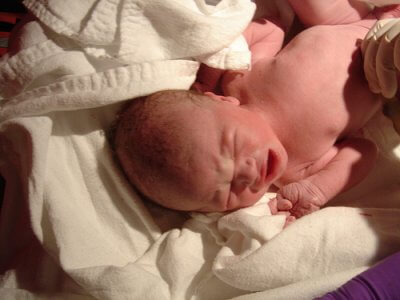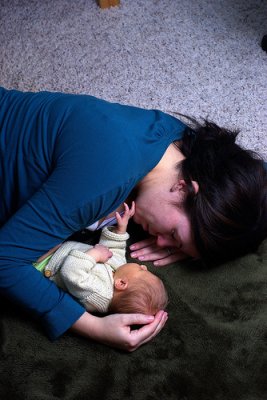Postnatal Anxiety – Are You a Sufferer?

By: David Goodman
Postnatal depression has received a lot of attention in the last few years. And yet a recent study from a Canadian University found that up to three times as many women suffered postnatal anxiety than suffered postnatal depression.
Postnatal anxiety – let’s get talking
It’s great that PND is now talked about. But the problem is that many women with postnatal anxiety are instead diagnosed with postnatal depression if they also experience low moods.
Anxiety involves negative and irrational thoughts. The shame this can cause leaves many women to downplay the anxiety side to their struggle. They do not want to admit to having thoughts that they are a terrible mother, or something bad will happen to their baby. This is especially true if anxiety also has them irrationally certain that if their thoughts were known, their baby will be taken away from them.
Women then receive treatment for depression which is not geared for anxiety. Antidepressants, for example, are not right for anxiety.
[Want to talk to someone about your anxiety as soon as possible? Visit our sister site harleytherapy.com to book counselling easily and quickly, worldwide.]
Symptoms of postpartum anxiety
Postpartum anxiety has the same symptoms as generalised anxiety disorder.
*Note that the difference between worry and anxiety is that with anxiety these symptoms will not be occasional. They will be consistent enough they affect your ability to function day-to-day.
Symptoms include:
- constantly on edge
- irrational, racing thoughts
- doom and gloom ‘worse case scenario’ thinking
- second guessing everything
- obsessive thoughts and behaviours
- mood swings that can include anger or crying
- feeling ‘buzzy’ then crashing
- physical symptoms like a beating heart, sweating, dry mouth, dizziness
- sleep problems
- compulsive behaviour (checking things again and again, sterilising things multiple times )
- leaving the house less than usual and avoiding certain places.

By: David J Laporte
Can I have postpartum anxiety and postnatal depression at the same time?
Yes. Some women have bouts of low moods followed by bouts of anxiety.
With depression you will feel exhausted, uninterested in doing anything, and will run over the past in your mind.
Anxiety, on the other hand, involves obsessive thoughts about an imagined future. You will feel a rush of buzzy energy that leaves you tense.
(Read our article on anxiety vs depression to understand more about the difference).
The kinds of thoughts that postnatal anxiety causes
Anxiety can cause thoughts that leave you feeling ashamed. But they are not you, they are the anxiety. These thoughts can sound like:
- I am going to contaminate my baby by giving him the wrong food
- I am going to accidentally harm my baby by dropping him, drowning him, falling asleep on him
- My baby is going to fall asleep and not wake up so I have to check every 15 minutes
- If I leave the house something bad will happen to me or my baby
- If anyone knows I am having these thoughts they will take my baby away from me.
Why do I have postpartum anxiety?
It tends to be a combination of factors.
Some of us seem genetically more predisposed to anxiety. So it might be that for you, giving birth triggered this predisposition. Many women who suffer postnatal anxiety already experienced anxiety before in their life, or some form of mental health issue.
If you previously had a miscarriage or traumatic birth, this is thought to be a factor.
Perfectionism is also thought to lead to postnatal anxiety.
And finally, you might have other stressors you are dealing with, such as relationship problems or money issues.
What can I do if I have postnatal anxiety?

By: Azlan DuPree
1.Recognise your thoughts are irrational.
Here’s a key thing to remind yourself of – anxiety makes us overestimate danger and underestimate how well we can actually deal with things.
2. Stop over-googling everything.
The internet is a wonderful resource but can be a vortex of doom for anxiety sufferers. If you are looking for a bad diagnosis you will find it. If you are worried about your baby’s health, call your GP.
3. Practise mindfulness.
Mindfulness is proven to help with anxiety. It helps you relax your body, recognise that thoughts are just thoughts, and leads you to be less in a terrifying imagined future and more in the present moment. Read our free and easy-to-follow guide to mindfulness to give it a try.
4. Try muscle relaxation.
Anxiety is a largely physical condition, leaving us with racing hearts and shaky energy. Approaching it through the body can be very helpful. “Progressive muscle relaxation” is a tool used by therapists to help clients with anxiety. It can take as little as ten minutes, and it’s easy to learn (read our article on progressive muscle relaxation).
5. Seek any and all support.
Talk to friends you trust, and reach out to a family member you think might help. Also consider places like online forums where you can talk to other women going through the same thing (or see if there is a support group in your area).
Professional support is also highly recommended, particularly if your anxiety is affecting your child, or sees you struggle to leave the house. Talk to your GP or book a session with a counsellor. If you find the idea of getting out hard, consider doing Online therapy, which means you can do a counselling session in the privacy of your home.
6. Try CBT.
CBT therapy is particularly recommended for anxiety. Its focus is on helping you gain control of your mind and learn to turn extreme thinking into balanced thoughts.
Do I really need to worry if I think this is me?
Again, all mothers have moments of anxiety. Being a mother is a big responsibility.
But if your anxiety worsens over time, goes on for more than a few weeks, and seriously affects your capacity to cope, then yes, it really is important to take it seriously. If you don’t manage anxiety it can cause panic attacks, major depression, and can also mean your child develops anxiety issues.
Harley Therapy connects you with warm, professional therapists in central London locations who can help you with postnatal anxiety. Not in London or the UK? Try our new sister site, harleytherapy.com, where you can book online or phone sessions no matter where you are in the world.





This is definitely me. I’m even crying typing this. I was abused as a child and I think I somehow blocked the memory, then my beautiful daughter was born 7 weeks prematurely. I think this is what triggered my memory. I’m very over protective of her and myself. I have a counseling session tomorrow so I am going to be brave and finally open up. Just hope I get the closure I really need. X
Hi there, just to say good for you for being so courageous, it’s wonderful to hear you are reaching out for the support you deserve. All the best.